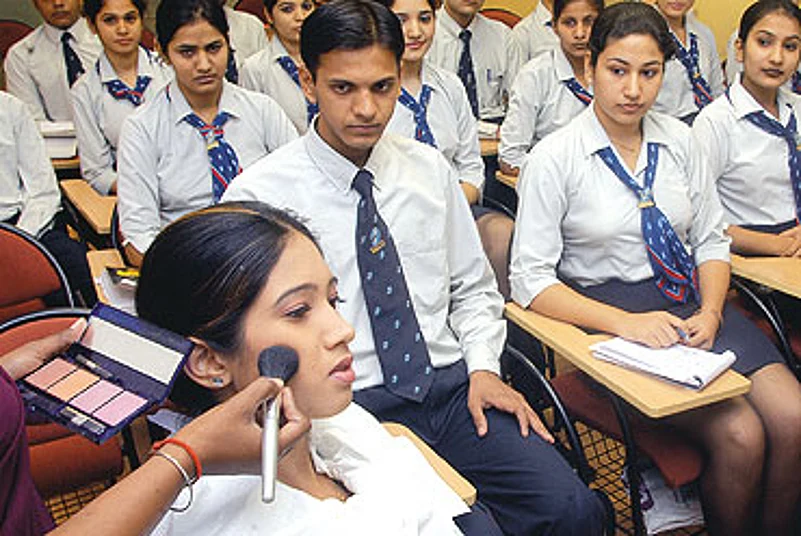
A visit to one of these training schools reveals that many of the students seem to hail from the families of modest means with little exposure to big-city sophistication. They have an uphill task acquiring fluency—let alone the correct accent—in English, and have to be drilled in the rudiments of grooming, such as making sure their shoes are polished and that stockings with runs are a no-no. Sapna points out: "Since this job promises the sky with minimum education qualification, we find a lot of youngsters from weak economic backgrounds and without college degrees attracted by it."
It is also the reason why the schools receive so many applicants from small and medium-sized towns who see this as a once-in-a-lifetime opportunity to widen their horizons. Take the case of Kashish, a seventeen-year-old aspirant from Lucknow, who is currently enrolled at Frankfinn’s Rajouri Garden centre in Delhi. She says that in Lucknow there are lots of girls barely out of school who feel stifled in their hometown and dream of becoming an air hostess. Quite like actress Soha Ali Khan in the film Dil Maange More who leaves her home and boyfriend in pursuit of her dream to fly all over the world. Kashish hopes to get a job with the Royal Jordanian Airlines "as they pay well".
Their dreams are fuelled by the big newspaper ads placed by airline training schools flaunting pictures of former students now with leading airlines. These ads give the impression that airlines come to these schools to recruit. The fact is that most airlines actually recruit through newspaper or website ads, or just by word-of-mouth. When quizzed about this, both Frankfinn and aha clarified that at the time of admission they make it clear to the candidate they don’t guarantee jobs but promise assistance in finding placements. For example, Frankfinn assists its students in their job hunt for 18 months.
School authorities, on their part, complain that most aspirants come with preconceived notions that good looks and height are the ticket to success. That’s no longer true. Sunayna Baruah, a former hostess with Swiss Air who imparts training to cabin crew aspirants in Bangalore, says, "The focus now is on smartness, communication skills and general knowledge." Sapna agrees, "A calm temperament, moderate English proficiency and a willing attitude also go a long way in impressing the interview board."
In fact, Sunayna admits she is often surprised to see girls from places like Tumkur or Mangalore, with "average looks," getting selected by well-known international airlines just on the basis of their inherent personality.
This should not come as a surprise since the newly-launched low-fare airlines, which sell food on board, require cabin crew who are good salespersons as well. In fact, the cabin crew get as much as 10 per cent commission on the sales they make onboard. What is also a new trend is the greater demand for male cabin crew members. According to industry estimates, the demand for dapper young men with crisp accent, a perfect tie-knot and nice-smelling aftershave might just touch 10,000 in the next five years. The ladies are waiting—in the aisles and in the seats.
Shobita Dhar with Prayaag Akbar






















